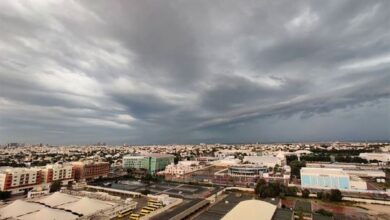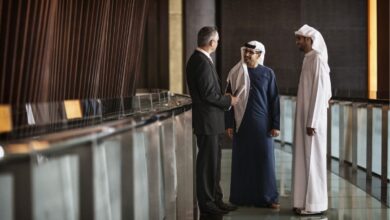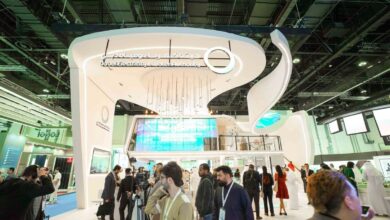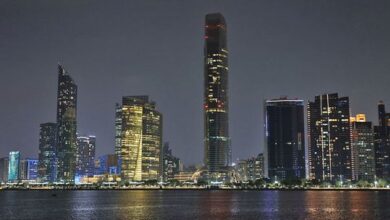DEWA is pioneering clean and renewable energy projects with the goal of reaching net zero by 2050

[ad_1]
For the first time, the world celebrates International Clean Energy Day this year with the approval by the United Nations of January 26 as International Clean Energy Day.
This date coincides with the anniversary of the establishment of the International Renewable Energy Agency (IRENA) in 2009. The United Arab Emirates is home to IRENA’s headquarters in Abu Dhabi.
HE Saeed Mohammed Al Tayer, MD and CEO of Dubai Electricity and Water Authority (DEWA), emphasized that the UAE is one of the leading countries in the transition to clean and renewable energy. It ranked second worldwide in the Energy Transition pillar of the Green Future Index (GFI) 2023 and the sixth largest per capita consumer of solar energy in the world.
Al-Tayer He noted that DEWA supports national efforts to consolidate sustainability systems and programs in various development sectors. The UAE aims to reduce greenhouse gas emissions by 19% in 2030, 62% in 2040, to reach net zero by 2050. The UAE also aims to triple the contribution of renewable energy and invest between 150 and 200 billion AED by 2030.
Net zero emissions by 2030
DEWA is on track to achieve wise leadership’s vision of achieving Net-Zero by 2050 through pioneering clean and renewable energy projects. He noted that the production capacity of the Mohammed bin Rashid Al Maktoum Solar Park has reached 2,627 MW using the latest global technologies. DEWA is on its way to achieving Dubai Clean Energy Strategy 2050 and the Dubai’s net zero carbon emissions strategy by 2050 Provide 100% of energy production capacity from clean energy sources by 2050.
DEWA projects supporting the clean energy transition
Mohammed bin Rashid Al Maktoum Solar Park
Between DEWAOne of Mohammed bin Rashid Al Maktoum’s key clean energy projects is the world’s largest single-site solar park using the Independent Power Producer (IPP) model, with a planned production capacity of 5,000 MW by 2030 Current production The capacity of the solar park is 2,627 MW and uses photovoltaic solar panels and concentrated solar energy (CSP).
DEWA will add 233MW by the end of the first quarter of 2024, increasing its production capacity to 2,860MW. When the 1,800 MW sixth phase of the solar park is completed at the end of 2026, the production capacity of the solar park will reach 4,660 MW. By then, the solar park will provide clean energy to 1.4 million homes. When completed in 2030, the solar park will reduce more than 6.5 million tonnes of carbon emissions per year.
The solar park has a Research and Development Center (R&D) and an Innovation Center. The Innovation Center is a global incubator for innovation in the energy and water sectors, and a major Dubai landmark that provides a pioneering experience for visitors to learn about the latest innovations in various fields of clean and renewable energy.
Hatta Hydroelectric Power Station
One of the innovative renewable energy projects that is currently being implemented DEWA is a pumped storage hydroelectric power station in Hatta. It will have a production capacity of 250MW, a storage capacity of 1,500 megawatt-hours, equivalent to 6 hours of storage, and a useful life of 80 years. The hydroelectric plant will use water from the Hatta Dam and an upper reservoir built into the mountain.
During off-peak hours, advanced turbines will use clean energy to pump water from the dam to the upper reservoir. Turbines driven by the speed of the waterfall in the upper reservoir will be used to generate electricity through a 1.2 kilometer underground water channel, with a high efficiency in energy generation and storage of up to 78.9% and with a 90-second demand response. electricity. With a total investment of AED 1,421 million, the project is expected to be completed in the first quarter of 2025. It is the first of its kind in the GCC region.
Shams Dubai Initiative
Through Shams Dubai initiative, DEWA encourages its clients to install photovoltaic solar panels on the roofs of their buildings and facilities to cover part of their energy needs. This is part of the Distributed Generation of Renewable Resources program in Dubai. The connection procedure consists of different stages with the support of an accredited contractor or consultant.
These stages include obtaining a Certificate of conformity (NOC), the design approval stage, uploading technical approval and notifying DEWA, site inspection and completion of the connection process, and finally electricity generation from solar energy. By the end of 2023, the total production capacity of solar energy projects within the initiative reached around 600MW.
The green hydrogen pilot project
DEWA has implemented a pilot green hydrogen project at the Mohammed bin Rashid Al Maktoum Solar Park. It is the first of its kind in the Middle East and North Africa to produce hydrogen using solar energy.
He green hydrogen project that DEWA has implemented in cooperation with Expo 2020 Dubai and siemens energy, It produces 20 kilograms per hour of hydrogen and the hydrogen gas storage tank can store up to 240 kilograms of hydrogen. The plant uses hydrogen through a hydrogen gas engine with about 300 kilowatts of electrical power capacity. The project has been designed and built to accommodate future applications and test platforms for various uses of hydrogen.
News source: Dubai Press Office
[ad_2]




